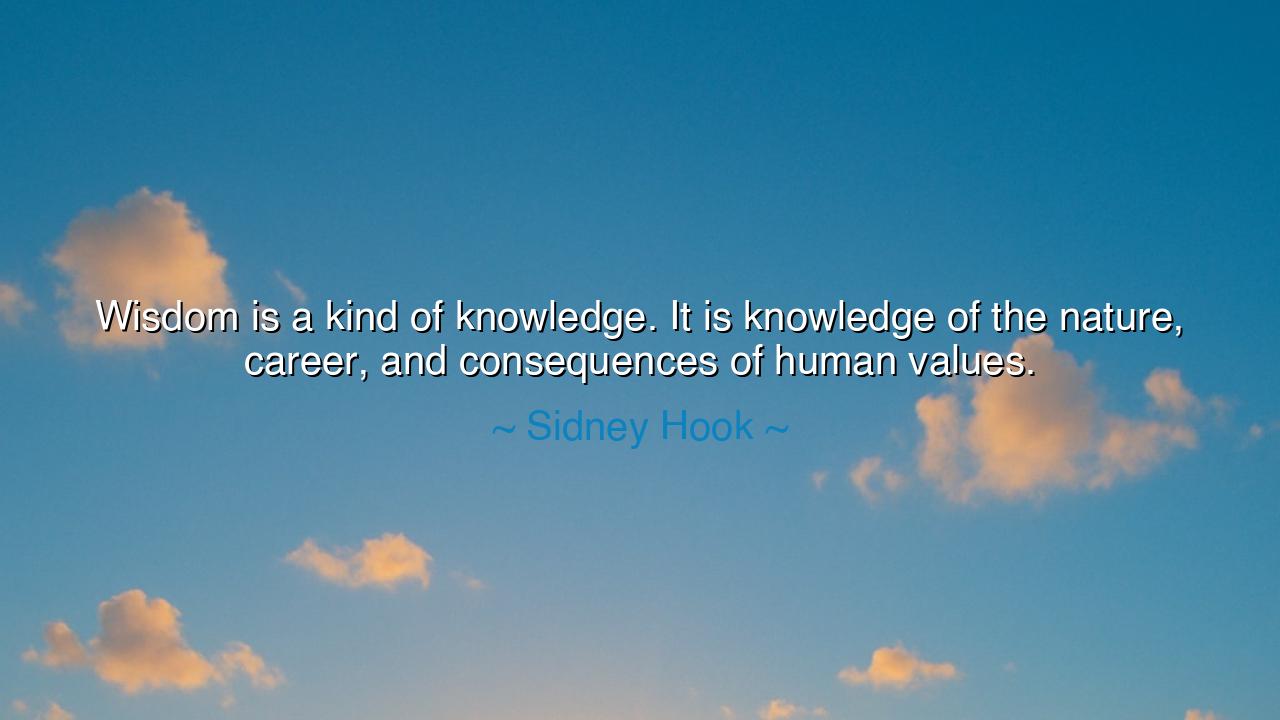
Wisdom is a kind of knowledge. It is knowledge of the nature
Wisdom is a kind of knowledge. It is knowledge of the nature, career, and consequences of human values.






The philosopher Sidney Hook, heir to the tradition of pragmatism, once declared: “Wisdom is a kind of knowledge. It is knowledge of the nature, career, and consequences of human values.” These words pierce to the heart of what separates mere learning from true understanding. For a man may gather facts as ants gather grain, but unless he discerns their meaning in the light of values, he has no wisdom. Knowledge alone equips the mind; wisdom guides the soul.
Hook teaches us that wisdom is not simply the possession of information. It is a higher order of knowledge: the grasp of what matters most, why it matters, and what follows when those values are embraced or denied. A computer may hold more data than a thousand men, but it cannot weigh love against hatred, justice against injustice, freedom against tyranny. Only the wise can trace the career of a value—how it rises, how it shapes lives and nations, and how it either blesses or curses those who hold it.
History abounds with lessons of this truth. Consider Socrates, who stood trial in Athens for corrupting the youth with dangerous questions. He possessed no riches and left behind no books, yet he pursued the essence of wisdom: to know what justice, truth, and virtue truly were. When he was condemned, he accepted death rather than betray his values. His knowledge was not of numbers or stars, but of the consequences of values, and this is why his teaching outlived his body and shaped the conscience of Western civilization.
Or look to the tragedy of Nazi Germany, where some of the most educated men of Europe—scientists, lawyers, and administrators—chose to serve a regime of hatred. They had knowledge, but they lacked wisdom, for they did not ask what their values meant, nor what consequences would follow from blind obedience. Their learning became a tool of destruction. Thus Hook’s words thunder through history: knowledge unguided by values is a sword in the hands of madness, but wisdom binds knowledge to justice.
The meaning for us is clear: to be truly wise, one must look beyond the surface of facts to the roots of human values. What is the nature of freedom? What is the career of compassion? What are the consequences of greed, pride, or cruelty? To ask such questions is to begin the journey into wisdom. Without them, we risk becoming clever fools—brilliant in skill, yet blind in judgment.
The lesson is both noble and practical. Do not be content with knowing how things work—ask why they matter. In every choice, consider not only the immediate benefit but the long path of consequences. Teach children not merely to solve problems, but to ask what ends their solutions serve. Let education be not only about science and trade, but about the cultivation of character and the weighing of values. For a society rich in facts but poor in wisdom is doomed to repeat its own tragedies.
Practical action lies before us. In your life, pause before choices and ask: what values am I serving? Where will this path lead if followed to its end? Seek the counsel of history, for it shows the long careers of justice, freedom, love, and their opposites. And above all, nurture not only intellect but conscience, for together they give birth to wisdom.
Thus, let Sidney Hook’s words be engraved in memory: “Wisdom is a kind of knowledge… it is knowledge of the nature, career, and consequences of human values.” Treasure this truth. For in a world overflowing with information, it is not the knowledgeable who will guide us, but the wise—those who see not only the facts of today, but the destiny they shape for tomorrow.






AAdministratorAdministrator
Welcome, honored guests. Please leave a comment, we will respond soon